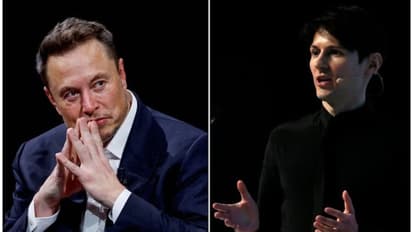Telegram CEO Pavel Durov arrested: Should X owner Elon Musk be 'nervous' as a free speech advocate?

Synopsis
Retired Lt Col Alexander Vindman, a key witness in the impeachment trial against former President Donald Trump, has suggested that Musk should be "nervous" following Durov’s arrest.
On August 24, 2024, Pavel Durov, the Russian-born founder and CEO of Telegram, was arrested at Bourget Airport near Paris by French authorities. This arrest is part of a preliminary investigation into the platform’s alleged involvement in facilitating criminal activities due to insufficient content moderation. Durov, a staunch advocate of free speech and digital privacy, is facing scrutiny over Telegram's role in disseminating illegal content, which critics argue presents significant challenges for law enforcement.
Telegram, which has over one billion users globally, has become an essential communication tool for various groups, including political activists and private individuals. Despite Durov's assertion that he has "nothing to hide," his arrest has ignited a broader debate about the responsibilities of tech companies in moderating content and the implications for digital freedom.
The arrest and its implications
Durov’s legal troubles come against a backdrop of heightened scrutiny over tech platforms and their handling of content. Having relocated from Russia in 2014 after clashing with authorities over user data privacy, Durov now holds dual citizenship in the UAE and France. His arrest in France raises significant questions about how governments globally manage online platforms amid rising concerns about misinformation and misuse.
Durov’s arrest has prompted strong reactions from both supporters and critics. Elon Musk, the owner of X (formerly Twitter), has voiced his disapproval, framing the situation as an attack on free speech. Musk has labeled the events as "dangerous times" and has rallied support for Durov using the hashtag #FreePavel. His stance has sparked discussions about whether his own advocacy for free speech could place him in a similar position.
Elon Musk and free speech: Is he at risk?
Retired Lt Col Alexander Vindman, a key witness in the impeachment trial against former President Donald Trump, has suggested that Musk should be "nervous" following Durov’s arrest. Vindman took to X to support the French authorities' actions, arguing that there is a growing intolerance for platforms that facilitate disinformation and malign influence. He implied that Musk’s role as a prominent advocate for free speech might put him under increased scrutiny.
"There’s a growing intolerance for platforming disinfo & malign influence & a growing appetite for accountability. Musk should be nervous," wrote on X.
Support and criticism among prominent figures
The arrest has drawn varied reactions from prominent figures. RFK Jr. condemned the French government's actions, emphasizing the urgent need to protect free speech. "The need to protect free speech has never been more urgent," RFK Jr. said.
Rumble CEO Chris Pavlovski and conservative commentator Ian Miles Cheong also criticized the arrest, arguing that it represents a broader attempt to control information and undermine free expression.
Douglas MacKinnon, writing in The Hill, has expressed apprehension that similar forces could target Musk. He notes a growing narrative in the UK and Europe calling for the arrest of Musk and the cancellation of X.
"As someone who pays close attention to the politics and the media in the United Kingdom and Europe, I began to notice a shocking narrative emanating from a growing number on the left there calling for the arrest of Elon Musk as well as the cancellation of X, the social media site he owns. Surely I thought, these people can’t be serious. But they were — and are — deadly serious. For them, Musk and X have become public enemy number one," MacKinnon wrote.
MacKinnon warns that "we live in increasingly perilous times," suggesting that leftist forces could seek to cancel X and arrest Musk.
"Could these forces on the left actually stop Musk? Could they cancel X and silence the voices of hundreds of millions of citizens around the world? I would not be so fast to say 'no', Mackinnon wrote.
Also read: Telegram CEO Pavel Durov arrested in Paris; THIS is the reason
The arrest of Pavel Durov highlights the complex intersection of digital privacy, free speech, and content moderation. As governments grapple with the challenges posed by online platforms, the outcome of Durov’s case could set a precedent for how tech companies are held accountable for content on their platforms.
For Elon Musk, the situation serves as a stark reminder of the risks associated with being a vocal advocate for free speech in an increasingly regulated digital landscape. Whether Musk will face similar scrutiny remains to be seen, but the arrest of Durov certainly raises questions about the future of free speech and the responsibilities of tech giants in managing their platforms.
Check the Breaking News Today and Latest News from across India and around the world. Stay updated with the latest World News and global developments from politics to economy and current affairs. Get in-depth coverage of China News, Europe News, Pakistan News, and South Asia News, along with top headlines from the UK and US. Follow expert analysis, international trends, and breaking updates from around the globe. Download the Asianet News Official App from the Android Play Store and iPhone App Store for accurate and timely news updates anytime, anywhere.